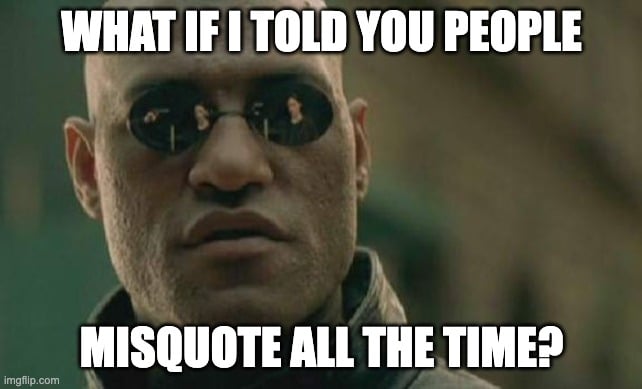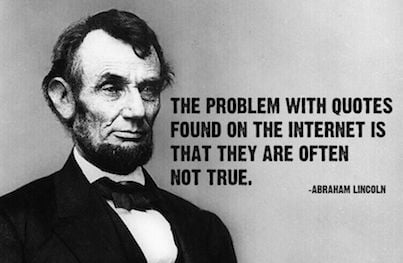What if I told you that many beloved quotations were never actually spoken or written by their supposed authors? Does that sentence make you think of Morpheus from The Matrix? Fun fact: Morpheus never says, “What if I told you…” in that movie.

The Mandela Effect—named after a widespread misconception about Nelson Mandela’s death—refers to collective false memories shared by many people, with a reach seemingly amplified by the advent of social media.
You may be familiar with this phenomenon as it applies to popular movie quotes, where misremembered lines sometimes become more famous than the actual dialogue from the films. Examples include “Luke, I am your father” from The Empire Strikes Back (actually “No, I am your father”), “Mirror, mirror on the wall” from Disney’s Snow White and the Seven Dwarves (“Magic mirror on the wall”—though every other version uses “Mirror, mirror”), and “Play it again, Sam” from Casablanca.
Because commonly misattributed quotes often reflect a kind of collective wisdom—and serious editing chops—they continue to offer valuable insights for professionals across industries. Business leaders and managers frequently employ these quotes to steer their decision-making and inspire their teams. Such succinct insights, partly because they are credited to renowned thinkers and leaders, permeate countless presentations and communications—which means they shape individual conversations, strategic planning meetings, and informal workplace discussions, too.
These 10 sayings have become integral to corporate discourse, influencing strategies and mindsets. They’ve endured because even collective misremembering can capture universal truths.
“If you can’t explain it simply, you don’t understand it well enough.”
Often attributed to Albert Einstein, this quote is a favorite among marketers, consultants, and educators. It emphasizes the importance of clear communication and deep understanding—skills that will always matter in any environment. What it doesn’t emphasize is fact-checking, as there’s no evidence that Einstein ever said these exact words.
The concept does align with his views on simplicity and understanding, however, which may explain the misattribution. The closest verified Einstein quote on this topic is: “Most of the fundamental ideas of science are essentially simple, and may, as a rule, be expressed in a language comprehensible to everyone.”
Not quite as quotable, is it?
“Be the change you wish to see in the world.”
This inspirational quote, often credited to Mahatma Gandhi, is widely used in discussions about leadership and social responsibility. It encourages individuals to take initiative and lead by example—a powerful message.
But Gandhi never said these exact words. The misattribution likely stems from a paraphrase of his actual statement: “If we could change ourselves, the tendencies in the world would also change. As a man changes his own nature, so does the attitude of the world change towards him.”
The simplified version has gained traction due to its brevity and inspirational tone, which makes it more suitable for motivational speeches and social media posts. Gandhi needed an editor, apparently.
“The definition of insanity is doing the same thing over and over and expecting different results.”
Frequently misattributed to either Albert Einstein or Benjamin Franklin, this quote is a rallying cry for innovation and adaptability. It’s particularly popular in discussions about problem-solving, process improvement, and organizational change.
Despite its widespread use, there’s no evidence that Einstein or Franklin ever said it. The earliest known appearance of this quote is in a Narcotics Anonymous pamphlet from 1981, though its roots could go as far back as the 19th century. This simple yet powerful message about the need for change and adaptation in the face of repeated failure is a concept that resonates with business leaders striving for success (as well as addicts hoping to recover).
“I have not failed. I’ve just found 10,000 ways that won’t work.”
This quote, widely attributed to Thomas Edison, has become a rallying cry for perseverance in the face of setbacks. However, it’s a posthumous revision of Edison’s actual words. In a 1910 interview, Edison stated, “I have not failed 10,000 times. I have successfully found 10,000 ways that will not work.” While this isn’t a misattribution per se, the revised version that has gained popularity subtly alters the original’s impact. The posthumous revision, though well-intentioned, somewhat dilutes the power of Edison’s original statement.
Edison’s actual words emphasize the deliberate, positive framing of his experiments more strongly. By using “successfully” and avoiding the word “just,” Edison’s original quote portrays his failures as intentional, productive steps rather than mere obstacles to be reframed. The popular revision, while maintaining the core message, loses some of this nuance. It shifts the focus slightly from active, purposeful experimentation to a more passive acceptance of failure. This subtle change, though small, weakens the quote’s alignment with the scientific method and its emphasis on the value of negative results. While both versions challenge the traditional notion of failure, the original more powerfully asserts the idea that eliminating unsuccessful approaches is not just acceptable, but a successful and crucial part of the inventive process.
“Well-behaved women seldom make history.”
Often misattributed to Marilyn Monroe, this quote is actually from historian Laurel Thatcher Ulrich. It’s frequently used in business contexts to encourage women to be bold, challenge norms, and take risks in their careers.
Ulrich coined this phrase in a 1976 academic paper examining Puritan funeral services, and later used it as the title of her 2007 book. The misattribution to Monroe represents something more complex than mere misquotation. It exemplifies how society often retroactively ascribes modern feminist sentiments to historical figures who fit a certain archetype. Monroe, despite her intellect and voracious reading habits, was primarily known for her looks and persona. This kind of misattribution reinforces stereotypes while attempting to challenge them, and also highlights the public’s tendency to seek pithy, inspirational quotes from celebrities rather than academics, regardless of the statement’s origin or context.
In business, this quote continues to fuel discussions about gender equality and the need for diverse perspectives in leadership, encouraging women to break barriers and make their mark in traditionally male-dominated fields.
“The best way to predict the future is to create it.”
Whether it’s been wrongly attributed to either management guru Peter Drucker or Abraham Lincoln, this quote—usually a comment on some aspect of entrepreneurship, innovation, or strategic planning—encourages proactive thinking and emphasizes the power of innovation to shape markets and industries.
However, the true origin of this quote is unclear. The earliest similar phrase may be from computer scientist Alan Kay in 1971: “The best way to predict the future is to invent it.” Sadly, this quote—even with only one wrong word, is rarely attributed to Mr. Kay, an early computing pioneer whose ideas have helped shape artificial intelligence models all these decades later.

“Be yourself; everyone else is already taken.”
Widely attributed to Oscar Wilde, this quote is often used in business contexts related to personal branding, authenticity in leadership, and standing out in competitive markets. Despite its popularity, there’s no evidence that Wilde ever offered these exact words to an audience.
The quote, however, does nicely align with Wilde’s known wit and emphasis on individuality. It feels like something he would have said or written. This misquote reminds professionals of the importance of authenticity and differentiation in a crowded marketplace, encouraging them to leverage their unique strengths and perspectives.
“I disapprove of what you say, but I will defend to the death your right to say it.”
Often attributed to Voltaire, this quote is actually from Evelyn Beatrice Hall, who wrote a biography of Voltaire under the pseudonym S.G. Tallentyre. She was attempting to illustrate his beliefs in one passage, not directly quoting the French Enlightenment writer, philosopher, and satirist François-Marie Arouet, who chose M. de Voltaire as his pen name. (Yes, one writer using a pen name wrote about another writer who used a pen name, and in doing so, errantly had her own words misattributed—possibly forever.)
The misattribution, often in support of an inclusive workplace where differing opinions are respected and valued, persists because it accurately summarizes Voltaire’s philosophy on free speech—which was Hall’s goal, after all.
“The journey of a thousand miles begins with a single step.”
Commonly attributed to Confucius, this is actually a paraphrase of a line from the Tao Te Ching, commonly attributed to Laozi. The actual text translates more closely to “A journey of a thousand li [a Chinese mile] starts beneath one’s feet.” This simple message about the importance of taking action, no matter how small, to achieve significant goals continues to inspire business leaders to start their ventures, launch new projects, or embark on organizational changes, reminding them that even the largest endeavors begin with small actions.
“There are no rules here—we’re trying to accomplish something.”
Popular in discussions about innovation, creative problem-solving, and challenging established norms in business, this quote is often attributed to Thomas Edison. Leaders who believe in disruptive thinking and pushing boundaries often employ the quote to encourage unconventional approaches. However, there’s no reliable source confirming Edison ever said this. He and Einstein seem to be in a posthumous competition of sorts. Edison wins the round in this post, at least.
Correctly Attributed or Not, a Good Message Endures
While these quotes may not have originated word-for-word from the sources to which we commonly attribute them, their impact on business thinking—and the world itself—is far-reaching. The persistence of these misattributions also offers a lesson about the power of a well-crafted message, regardless of where it comes from. At the same time, it serves as a reminder that critical thinking and fact-checking still matter (or should), and that human memory and perception are forever malleable.
These misattributed quotes are, in a sense, lies that tell us truths about leadership, innovation, and success. Should we judge wisdom by its lineage, or by its ability to enlighten us? As Picasso said, perhaps “art is a lie that makes us realize truth.”
Now you’re thinking: Did Picasso really say that?
You might also like:
Rare Bird delivers versatile marketing and digital solutions to diverse clientele across nearly every industry. Ready to leverage our expertise to address your business needs?
Let's talk.